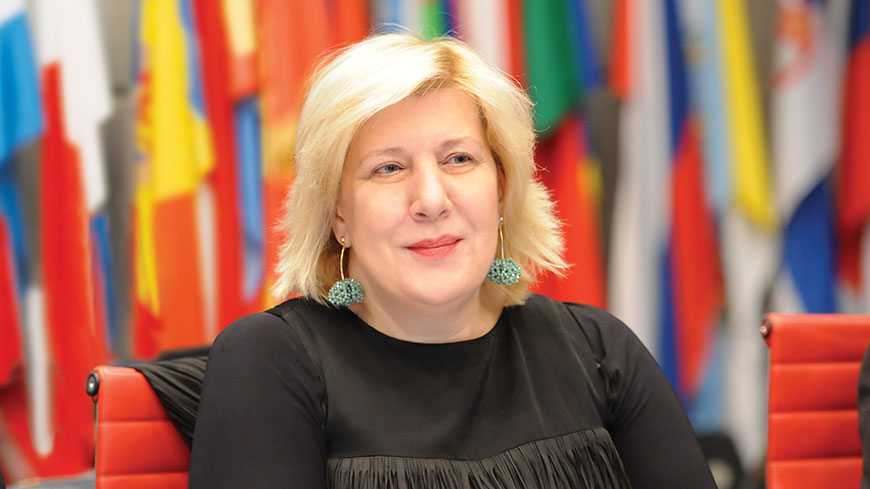Speech (delivered online) at the Conference organised by the Université Paris Nanterre to mark the 75th anniversary of the Universal Declaration of Human Rights, by Dunja Mijatović, Council of Europe Commissioner for Human Rights
Excellencies, Dear participants,
It is a great honour for me to be among you. I am here both as a speaker and as a witness to the transformative power of human rights. They have had a profound impact on both my personal and professional life.
Growing up in Sarajevo, human rights once seemed a distant concept to me. But, as war tore through my homeland, causing loss and displacement, these rights transformed from abstract ideas into a beacon of hope.
And in my capacity as Council of Europe Commissioner for Human Rights, I have had the privilege of visiting many member states, meeting people who have borne the brunt of human rights violations and witnessing the difference that human rights make in people’s lives.
I am therefore very grateful for this opportunity to discuss human rights at a time when they are increasingly being challenged, undermined, and in some cases denied, both in Europe and globally.
The vision of peace, democracy, and justice contained in the UDHR has led to remarkable progress, freeing many from oppression and poverty. But this journey has also been marked by setbacks. The tragedies of the former Yugoslavia, Chechnya and Ukraine are stark reminders of this.
In our current climate, where the actions and rhetoric of some political leaders and extremists often violate and undermine human rights, it may seem that progress has stalled.
But this perception is misleading.
Over the past 75 years, the relationship between human rights rhetoric and actual progress has been asymmetrical. While political rhetoric was largely supportive of human rights until the new millennium, progress has been slower than expected.
For example, France, a key player in the drafting of the European Convention on Human Rights, took 24 years to ratify it. Similarly, the decriminalisation of homosexuality in various European countries has been a lengthy process, largely accelerated by the European Court of Human Rights in the 1980s and 1990s.
The system of human rights protection itself was less developed. For example, the right to individual application to the European Court of Human Rights was only optional until 1998.
Despite the current widespread hostility to human rights, however, progress continues. The Council of Europe has adopted nearly 50 legally binding texts in the last two decades, as well as numerous soft law instruments.
The development of the European Convention on Human Rights, through its protocols, reinforces this progress. The Istanbul Convention, despite facing setbacks, has significantly advanced the protection of women from violence and raised political awareness in many countries. In addition, the prohibition of corporal punishment of children, once limited to eight member states, has now expanded to 34.
So the picture is more nuanced than it appears to be.
The challenge for the future is twofold: to understand the growing hostility to human rights and to prevent this negative sentiment from reversing our progress.
One reason for the current hostile climate, I believe, is from a deep-seated frustration, uncertainty, and insecurity among many in Europe.
These feelings, often fuelled by growing inequalities, lead some to perceive human rights as irrelevant or exclusive to certain minority groups. As a result, some governments and mainstream parties misinterpret this frustration as a call for fewer human rights and align themselves with xenophobic, misogynistic and extremist agendas to regain popular support.
The second challenge is countering the growing negative rhetoric against human rights. We have become so accustomed to the success of human rights that we have neglected the need to defend them vigorously.
It is time to renew our commitment.
States have the primary responsibility in this effort. They must bring their laws, policies, and practices into line with international human rights obligations, provide effective remedies and step up efforts to prevent violations. It is also essential that they reaffirm and protect the universality, indivisibility and interdependence of human rights, including by strengthening the protection of economic, social and cultural rights. Politicians must also lead by example, both in public discourse and in action.
However, we, as individuals, should not refrain from contributing to the protection of human rights.
To bring society into line with human rights standards, we must all contribute, by stepping out of our comfort zones. Lawyers, academics, intellectuals, and concerned citizens must engage in public debates to dispel misconceptions and prejudices. It is also crucial that the human rights community becomes more inclusive. Better communication is needed to address the current discontent, uncertainty, and relativism, and to demonstrate the relevance of human rights for everyone.
Easier said than done, I know. Myths and disinformation often outpace the steady progress of human rights. That is why we must also accelerate our efforts, starting with human rights education, not only in formal settings but in everyday conversations, through social media, and the press.
At the beginning of my remarks, I said that I stand here today also as a witness. Beyond my personal experience, I have observed as Commissioner several trends that give me hope for the future.
Recent commitments by heads of state and government at the Council of Europe Summit, and the resilient response to crises such as Russia’s war of aggression against Ukraine, underlining a continuing commitment to human rights.
Moreover, the dedication of NGOs, journalists, human rights defenders, and activists, including young environmentalists, often facing great personal risk, reminds us that the principles and vision of the UDHR continue to inspire across generations.
I believe these are compelling reasons for optimism, but they also raise critical questions: How can we harness these positive trends to advance the cause of human rights? How can we bridge the gap between rhetoric and reality to promote a narrative that is both inspiring and uplifting?
The task of finding answers is up to all of us, and will require determination and collective effort.



